Asian Elephants in Captivity
Elephants are in Trouble
Asian Elephants like their African Cousins are in trouble. Poaching for ivory is decimating herds in Africa at a rate which could wipe out wild populations within a generation. I find it staggering that estimates of up to 50 Elephants a day are being lost. Asian Elephant populations have also tumbled from 100,000s to perhaps around 40,000 in the wild in less than 100 hundred years. That's the population of a small town. There are now over 7,000,000,000 humans. That's almost doubled in my lifetime. It's also been estimated that a terrifying 50% of all wild animals overall, have been lost in the same timeframe. I photographed this family of Asian Elephants on a recent visit to Whipsnade, as they ate their afternoon tea of hay, suspended from the ceiling in hammocks. It makes it a bit more interesting for them, challenging. Exercising their trunks and agile minds.
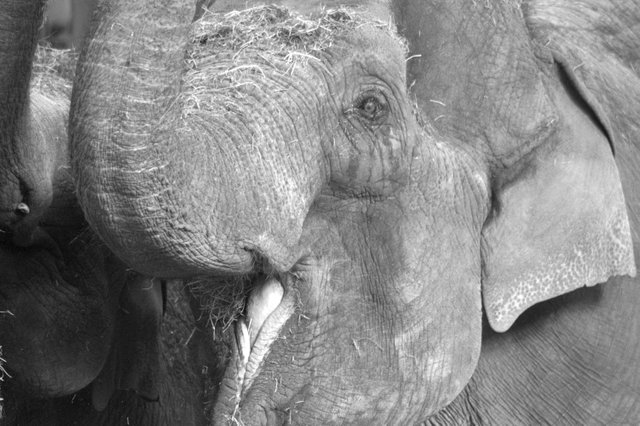
A Delicate Relationship
Asian Elephant populations are under threat from deforestation, which humans have an incredible appetite for. We clear forests, sell the timber and generally plant monoculture crops in their place. It's not a sustainable practice and it's the animals who suffer, but we who reap the rewards. For how long ? Nature is fragile and interdependent. Everything we have and are is from nature. We are not set apart from it. How will we survive long term if we can't look after nature? We won't.
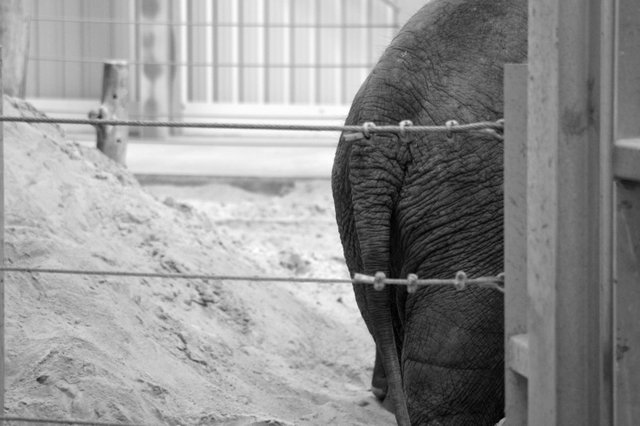
Comprehension is Not Enough
Fortunately, great collective mind of humanity does understand that emblematic creatures like Elephants have as much right to exist as us, because they are large intelligent mammals. It doesn't secure their future though. There is a price on every Elephant tusk in the world and their habitats increasingly fall to the triple threat of agriculture, pollution and climate change. Although we may realise the importance of Elephants, what about amphibians, reptiles, fish, molluscs ? or plants.
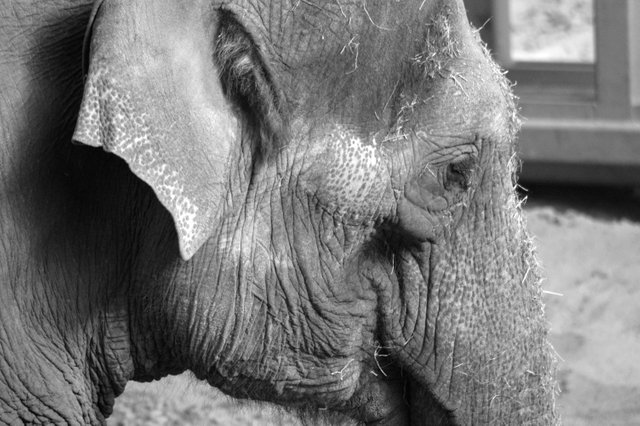
Frogs & Orchids
We don't seem to be so aware or bothered about the plight of Frogs or Orchids but we must take steps to ensure that when we exploit a resource, we don't take it all. Just like our ancestors did. They only took what they needed and they didn't have technology to help them. They perhaps also lacked the appetite to take more than they need and exchange it with others for resources.
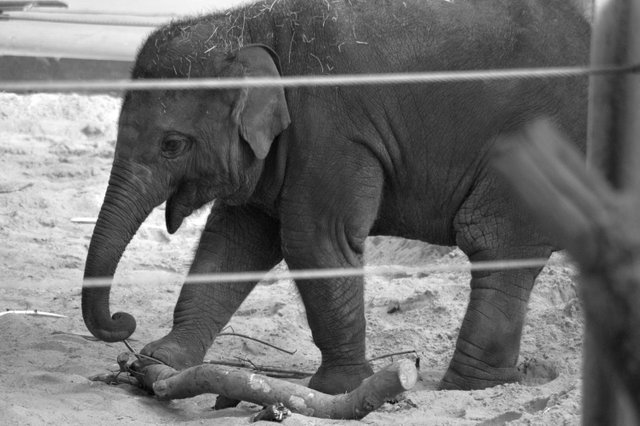
Sustainable Humans
The Native American Tribes of North America lived off the plains in this sustainable manner for thousands of years with life teeming an nothing wasted until European people decimated the people and the land by primarily hunting for pelts and then extinguishing everything in their path, including the way of life of countless indigenous people.
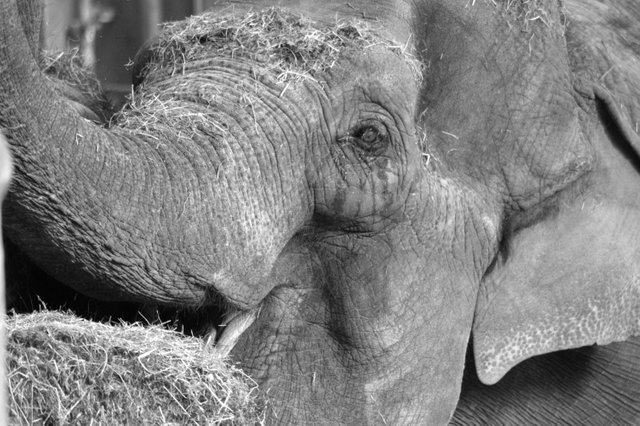
Living in Harmony
Asian Elephants in captivity are numerous in Asia, perhaps as many as 15,000 exist as kept animals so their existence may be slightly less perilous than their African cousins. People are afraid of these mighty beasts, for they can raid farms for the nutritionally dense crops being grown and angry Elephant can easily crush a human. Humans and nature may have not existed in harmony for many thousands, perhaps millions of years, but at least in the past we were not so numerous. Since we invented weapons, we have been clearing the forests and plains for food and also clearing out the creatures which we see as a threat. Wolves, Bears and Wild Boar have not roamed England for a long, long time, although a small feral population do now scratch a living in the South East.
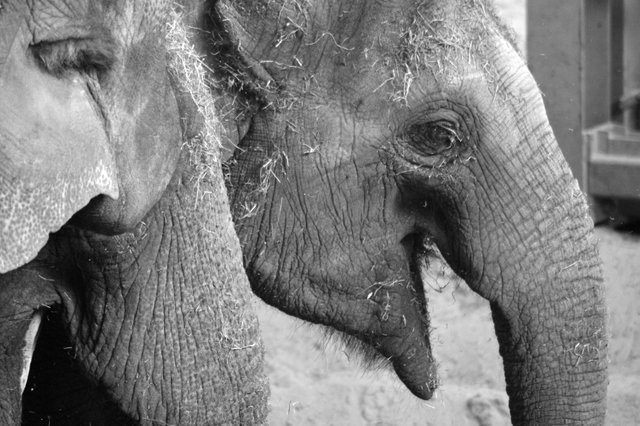
Domesticated People
These captive Elephants live peacefully at Whipsnade. I'm not sure how they experience their domesticity. It must in some ways be similar to how we live. They are indeed intelligent animals and although I may have mixed feelings about large animals in captivity, overall, I feel that these mighty beasts are in good hands. They provide a valuable educational opportunity for humans and their presence may help in some small way, save their wild cousins future. I hope so.
If you donate 1 SBD or STEEM to @a-0-0 I will resteem your last post to over 72,500 followers on my 2 accounts @a-0-0 and @a-a-a
Congratulations! this post got an upvote by @steemrepo and was manually picked by the curator @yanosh01 to be added on STEEM REPOSITORY, simply comment "YES" and we upload it on STEEM REPO Website.
Want to know more about the Steem Repo project? Contact us on Discord
YES
interesting. Do you work in a zoo?
thanks @yanosh01, no I just visited one recently. A wildlife park which is part of ZSL called Whipsnade
Nice read. I leave an upvote for this article thumbsup
:) thanks @tomask-de !
In general, I actually like animals more than 'humans' these days, so of course I like the fact you are helping to spread the word about their potential demise at the hands of 'people'.
thanks @averageoutsider I know what you mean, but there is a huge repository of goodness in humans, if it can just be liberated !
You got a 4.24% upvote from @postpromoter courtesy of @outerground!
Want to promote your posts too? Check out the Steem Bot Tracker website for more info. If you would like to support the development of @postpromoter and the bot tracker please vote for @yabapmatt for witness!
Not sure if you'll find this humorous, but my sleep deprived Dad brain read the title as "Asians in elephant captivity" and thought I was about to read the strangest thing I've seen all week.
that is quite funny. As a sleep deprived Dad myself. I find myself doing that with various news headlines and sometimes do a double take. the mind plays tricks on the unwary Father ;) ! thanks for the comment @mjo
It is sad to see elephants endangered especially since every time in recorded history, unless the extinction of elephants can be predicted and prevented, it may not be possible avoid.
You mentioned briefly the plight of the Native American People. Who's to say Native Americans are indigenous to the U.S. ? If ever there could be an example of human zoos, Reservations may qualify. Think about it. Animals are taken from their native lands and placed in zoos. Does not a Reservation represent human populations displaced from their native habitat in favor of Nation Building? Fortunately with the advent of the internet (this medium) Elephant populations as well as all other populations including human ones can be better monitored and their predators brought to justice.
good point @virtus-q the Native American people, like all humans alive today originated from Africa. They took a long time to get there. Ongoing studies suggest that all Native American People, North Central & South came to the American continent between 50k-17,000 years ago. I'd say that makes for indigenous and your comment about reservations is interesting. My article was not really about the Native American people, but I used them as an example of how to live sustainably for thousands of years, using nature's resources carefully so that time replenishes them ;) Hopefully better monitoring of people, Elephants, Frogs and Orchids will mean that our Grandchildren will enjoy living in a world still rich in nature.
STOP